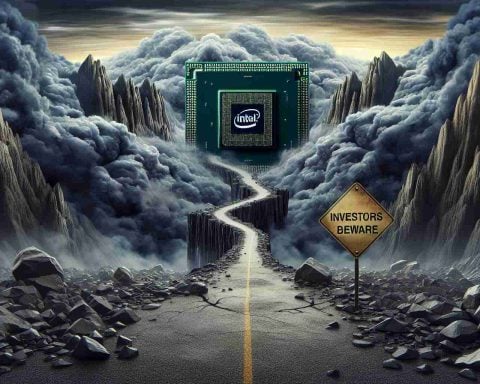Tech Giant Google Sets a New Benchmark in Quantum Computing
In an unprecedented move, Google has revealed its latest innovation in quantum technology— the Willow chip. Developed by their Quantum AI team, this chip demonstrates computational powers that surpass current technology by unimaginable margins. Google’s Willow performed a complex problem-solving task in just five minutes, a feat that would take today’s top supercomputers billions of years to complete.
The implications extend beyond technological milestones, suggesting the possible existence of a multiverse through quantum computations. This bold idea highlights the transformative potential of quantum computing, stirring both excitement and debate among scientists.
A New Era for Semiconductor Strategy
The Willow chip signifies a paradigm shift in the competitive dynamics of chip manufacturing. Industry analysts predict a substantial impact on traditional powerhouses like NVIDIA, which currently dominate the high-performance computing market with their GPUs. As quantum computers gain traction, speed, and practicality, they may redefine areas like drug discovery and AI. This potential revolution poses a strategic challenge to well-established tech companies, who must now adapt to this fast-evolving landscape.
Investment and Innovation Surge
The burgeoning quantum sector is attracting significant interest and capital, with startups receiving $1.5 billion in funding in 2024 alone. Concurrently, governments, including the US, are ramping up their investments, emphasizing quantum research’s strategic importance.
Navigating the Quantum Frontier
As the industry gears up for rapid innovation prompted by Google’s announcement, companies must harness their strengths while exploring quantum capabilities. The race for supremacy in the quantum era has begun, promising considerable challenges and opportunities in reshaping tomorrow’s high-performance computing world.
Google’s Quantum Leap: Discover the Game-Changing Willow Chip
Revolutionizing the Quantum Landscape
Google’s Quantum AI team’s unveiling of the Willow chip has sent ripples across the tech world, establishing a new benchmark in quantum computing. This breakthrough points to a future where technology operates at speeds unthinkable by today’s standards, opening the door to vast possibilities in computation and beyond.
Quantum Computing’s Real-World Applications
The exceptional capabilities of the Willow chip are poised to transform various sectors. In drug discovery, quantum computing could lead to unprecedented speeds in modeling complex molecules, cutting down years of research into just days. AI systems, bolstered by quantum processing, might achieve new heights in learning and efficiency, drastically expanding their utility.
Pros and Cons of Quantum Computing
While quantum computing offers numerous advantages, challenges remain.
Pros:
– Unmatched Speed and Processing Power: Capable of solving problems that are currently insoluble by classical computers.
– Revolutionary Scientific Discoveries: Potential to accelerate breakthroughs in fields such as chemistry, physics, and materials science.
Cons:
– High Development Costs: The investment needed for research and development is massive.
– Complexity and Error Rates: Quantum systems are highly complex and currently face significant error rates that must be managed.
Market Analysis and Trends
The quantum computing market, buoyed by innovations like the Willow chip, is expected to grow exponentially. Analysts anticipate that this growth will attract more startups and established players, fostering competitive collaboration. As companies like Google lead the charge, the demand for skilled quantum computing professionals is also projected to rise.
Security Aspects and Challenges
Quantum computing’s power also poses potential security challenges. Current encryption methods, grounded in classical computing, could become obsolete with the advent of quantum decryption capabilities. This necessitates the development of quantum-resistant cryptography to safeguard sensitive data.
Predictions and Future Outlook
Looking ahead, the quantum computing trajectory suggests accelerated advancements in the next decade. Google’s pioneering efforts with the Willow chip are likely a precursor to even more significant innovations. The quantum landscape will not only redefine technological capabilities but also challenge our understanding of science itself.
For more insights on quantum computing advancements, visit Google.
By focusing on the practical implications, potential challenges, and broader market impact, we can better understand the transformative nature of Google’s latest quantum computing achievement and the future it heralds.



















